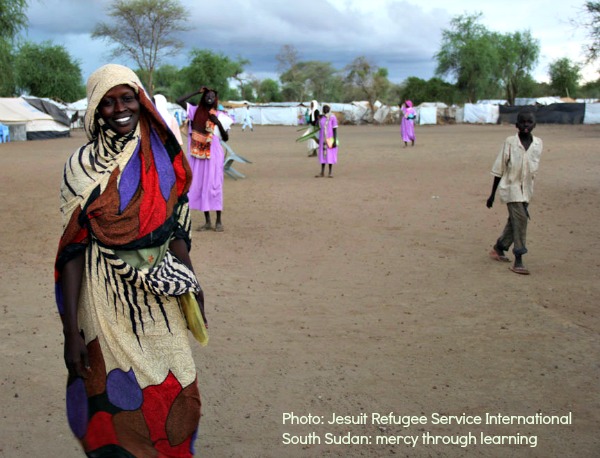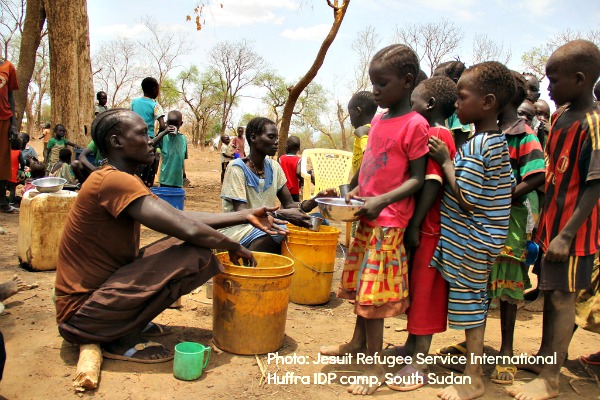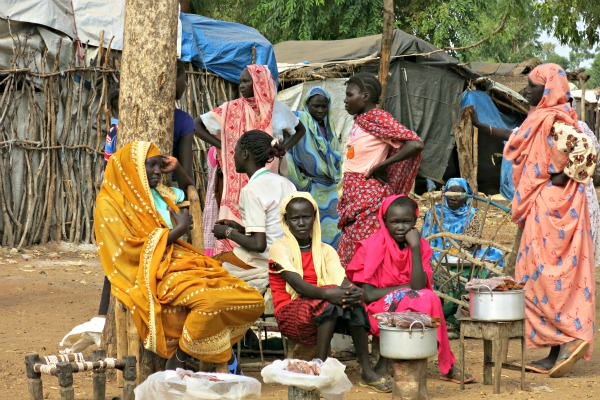
Darkness falls early in South Sudan. When the unspeakably bright sun sleeps, there isn’t much to illuminate the hot air. Just fireflies, the headlights of occasional military trucks, and the night stars. Mind you, sitting out in the Jesuit Refugee Service (JRS) compound in Maban, in the remote far north of this troubled new country, I realise I have never before seen so many stars – great crops of them – too bright and too abundant to sketch an outline of any constellation familiar to my eyes.
South Sudan is a confounding place. Certainly, it is captivatingly beautiful. In rainy season it is lusciously green – the flat landscape punctuated by the smallest of mountains and the tallest of trees, with vast wide trunks and tiny birds painted in brilliant chalky blue or tomato-red.
The people are tall too. And they stand up straight. The bright cloths of women’s clothes up close against the intense darkness of South Sudanese skin is striking to see.
Then there is the coffee: rich, thick, sweet, aromatic, laced with ginger, almost medicinal. And the singing which breaks into spontaneous parts, the beat slow. The dancing is free. The welcome is warm.
There is a South Sudan that overflows with beauty and natural glory; the slowness of pace somehow scripted to encourage the savouring of each sensory surprise.
But there is another South Sudan too that jostles harshly for attention: poverty, filth, hunger, disease, exploitation, corruption and self-perpetuating cycles of extreme violence.
The people of South Sudan have endured war on and off for 60 years. The signing of the Comprehensive Peace Agreement between the South and the North in 2005 and declaration of Independence in 2011 heralded a brief period of optimism. Investors came. Refugees who had been scattered to Uganda, Ethiopia and Kenya returned to rebuild their lives. But in December 2013, a dispute between two men, formerly colleagues at the top of the same government, sparked a civil and ethnic war that has since displaced 1.6million people inside and flung 600k outside to its neighbours once again. And it is getting worse. It is now much more complex than a fight between two tribes. Others are being drawn in, clan within clan, even in previously peaceful areas: a JRS project in Western Equatoria had to be evacuated briefly just a few weeks ago.

International donors are beginning to tire of a conflict that never wanes. The regional UN appeal for South Sudan is only 13% funded, leaving many development programmes out of reach, particularly for education, both in South Sudan and for refugees in Uganda and Ethiopia. The World Food Programme is reducing food rations everywhere as it struggles to respond to competing global crises. Deadlines for peace deals in South Sudan come and go; another internationally-led compromise agreement left unsigned earlier this month. Officials who follow the peace talks speak of a whole nation, from its leadership down, too traumatised by violence to make decisions. Too wrapped up in pain to forgive.
In the meantime, towns change hands between fighting groups. People flee their homes. Stories of rape and mass atrocity go uninvestigated. Almost half the population struggles to get enough to eat as crops remain unplanted, famine now a real and present risk. There are long queues at petrol stations. Prices are rising. Business is collapsing.
Indeed, the only industry obviously flourishing is international aid and businesses that serve it. The roads are full of white 4x4s with international logos. In Juba, there are smart restaurants on the Nile to cater for westerners who work in NGOs; NGOs who advertise their good works on placards outside slum settlements just the other side of the river. Other westerners come for business that supplies the aid industry. In a hotel lobby, I watched young local women being traded for the night between foreign workers, in full view.
Schools that were built in hopeful times now lie abandoned or overtaken by militias. The country is awash with weapons but their government goes on diverting money from its children into arms. Teachers go unpaid or else paid so poorly that they take work as doormen for NGOs. Illiteracy in South Sudan stood at 70% before this latest conflict spiralled. One million children were then out of school. A further 400k have since been added to their number – leaving boys easy prey for rebel groups to recruit, and young girls with no option but early marriage.
What hope for this country without education? How can a people hold its feckless leaders to account and demand the peace they deserve when they cannot even read or write?
The night we sat under the stars in Maban I was thinking about the contradictions of South Sudan. The ugliness of its poverty. The brutality of its suffering. And yet the resilience of its hope. I thought of the enthusiasm I had witnessed from the children living in Huffra camp for the internally displaced as they crowded into the makeshift classroom JRS built with their parents: children visibly malnourished, but hungry to learn. Of the poise and warmth of the women from the community who cooked the meagre rations of sorghum we provided for their children to eat. The hilarity at the JRS youth club as the youngsters posed for photos – all dusty knees, gangly limbs and teenage hand gestures. The teachers being trained to serve their community – many of whom must start from scratch, having been themselves unable to finish school. The dignified determination of the elderly man, attending adult literacy classes so he could write his name for the first time.

But it was to Doro Refugee Camp that my mind kept returning – to the few hours I spent with our home visits team. Here were refugees from Sudan, caught between two wars – one they fled when Khartoum bombed its own out of Blue Nile state, and one they met in the South after they thought they had found safe exile.
The JRS team of volunteers visits the most vulnerable in this camp regularly – volunteers who were themselves refugees, accompanying others in their journey just as they were accompanied before. We came to see two women, neighbours now, thrown together by circumstance, both struggling to keep life going for their children, heading their household alone.
We crossed the dust of the camp and stopped in a clearing between the huts. There was an easy familiarity to the encounter that followed; a routine to the way the home-made wooden benches and broken plastic chairs were brought out for us, arranged under the shelter of the tree, a jug of water sploshed down in the middle of our circle in costly hospitality. There were smiles and greetings. But conversation was slow. Not much was said and the pauses were long.
In the heavy heat and extended silences, my eyes began to wander. A young boy was spin-wheeling a plastic lid with a stick across the entire length of the dirt road in front of the huts. A cheap toy; his clothes torn and soiled, his feet bare. It picked up speed and then he ran! Quick light speed! He returned beaming but breathless, adopting nonchalant indifference once his eyes caught my gaze.
My eyes returned to the women, the circle motionless and quiet for some time. “What did she say?” I whispered finally to the young man who was translating for me.
He wearily ran his hands across his face. Another extended pause.
My eyes wandered again – distracted now by the goats outside a neighbour’s hut, bleating noisily as the kid nudged its mother for milk.
“She says they are hungry. They don’t have enough to eat.”
It was polite, sparse and matter of fact. But the words were raw, a blow to the gut that lingered heavily in the heat. I felt a smart of shame. Hers and mine. And then a rush of helplessness before I inwardly turned my anger on the Lord: “Do you hear the cry of the poor?”
She took her sleepy daughter out of the sling on her back and stood the little girl down in the dust in front of us. Then waddling unsteadily in our direction, she smiled the broadest of smiles. A smile as wide as the boughs of the South Sudanese trees. A smile that gloriously and abundantly answered, “Yes. Do you?”
Author; Sarah Teather, 24 August 2015
Sarah Teather is an International Advocacy Adviser for the Jesuit Refugee Service (JRS) – an international Catholic organisation active in 50 countries, with a mission to accompany, serve and advocate on behalf of refugees and other people who are forcibly displaced. She spent a month this summer in East Africa, travelling with JRS, seeing projects serving refugees in and around South Sudan. Sarah was previously MP for Brent Central (2003-2015) and Minister of State for Children and Families in the Coalition Government (2010-2012).

